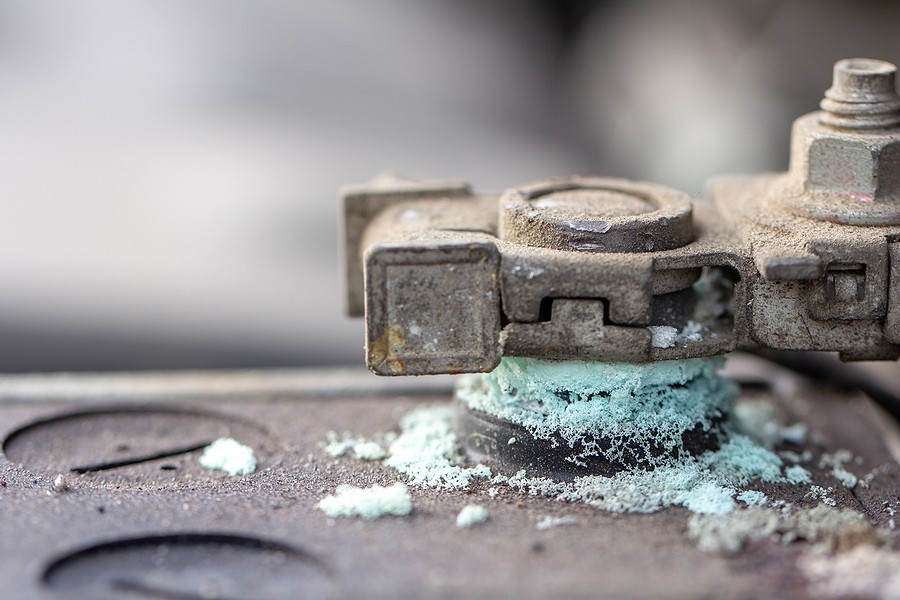Nobody wants the frustration of a car that won’t start, leaving you stranded in your driveway or a parking lot. Car batteries typically last between three and five years, but this lifespan can vary depending on factors like climate, driving habits, and the specific vehicle. Many car owners don’t realize their battery needs replacing until they encounter significant problems.
 Close-up of corroded car battery terminals
Close-up of corroded car battery terminals
Are you wondering if your car battery is nearing the end of its life? Understanding the signs of a failing car battery is crucial for preventative maintenance. We’ll explore how to tell if your car battery is bad, outlining key indicators to help you determine if it’s time for a replacement.
1. Corrosion on the Battery Terminals
One of the most visually apparent ways to identify a potentially bad car battery is to check for corrosion on the terminals. Open your car’s hood and locate the battery, paying attention to the points where cables connect to the positive (+) and negative (-) terminals. If you observe a blue-green powdery or crystal-like substance buildup on these terminals, it’s a strong indication of battery issues. This corrosion is caused by battery acid leaking and reacting with the metal terminals. While cleaning corrosion can sometimes temporarily improve battery performance, its presence signals an underlying problem and suggests that battery replacement is imminent or necessary.
2. Warped or Swollen Battery Case
Just as you’d be concerned about a swollen phone battery, a warped or swollen car battery case is a serious warning sign. A healthy car battery case is typically rectangular with flat sides. If you notice bulges, swelling, cracks, or an overall distorted shape, it indicates internal problems within the battery. These distortions can be caused by extreme temperatures, overcharging, or age-related degradation. A deformed battery case is a clear indicator that the battery’s integrity is compromised and it needs to be replaced.
3. Rotten Egg Smell Emanating from Under the Hood
An unpleasant rotten egg smell when you open your car’s hood is a strong indicator of a leaking car battery. This distinctive sulfurous odor arises from hydrogen sulfide gas, which is produced when battery acid leaks. A dying lead-acid battery can vent this gas, which smells like rotten eggs, sewage, or even well water. Leaking battery acid is not only a sign of a failing battery but can also be corrosive and potentially dangerous. If you detect this smell, it’s crucial to have your battery checked and likely replaced as soon as possible.
4. Dim or Flickering Headlights
A weakening car battery can manifest in sudden electrical problems, and one of the most noticeable symptoms is dim or flickering headlights. When the battery struggles to provide consistent power, your headlights may appear significantly weaker than usual. They might also flicker or fluctuate in brightness. While dim headlights can sometimes be due to other electrical issues, they are often an early warning sign of a failing battery, especially if they worsen or are accompanied by other symptoms listed here.
5. Experiencing General Electrical Issues
Beyond headlights, a dying car battery can trigger a range of general electrical problems throughout your vehicle. These issues can affect various systems and components:
Here are some common tertiary signs of a bad car battery affecting electrical systems:
- Heated Seats Not Working: If your heated seats are failing to turn on or are weaker than usual, it could be due to insufficient power from a weak battery.
- Dashboard or Radio Malfunctions: Intermittent or complete failure of your dashboard display or car radio can be a sign of inconsistent electrical supply.
- Flickering or Dim Dashboard Lights: Dashboard lights that blink, flicker, or are dimmer than normal can indicate a battery struggling to maintain voltage.
- Power Window Problems: Slow or non-responsive power windows, or a sunroof that’s not operating correctly, can be linked to a weak battery.
- Phone Charging Issues: If your phone fails to charge when plugged into the car’s charging port, it could be a symptom of broader electrical issues stemming from the battery.
It’s important to note that while any of these electrical problems individually might not definitively point to a bad battery, experiencing several of them together significantly increases the likelihood of battery failure. Always check under the hood to look for more direct battery signs if you notice these electrical issues.
6. Clicking Sounds When Turning the Key or a Slow-Starting Engine
One of the most telling signs of a bad car battery is difficulty starting the engine. When you turn the ignition key, and instead of the engine turning over, you hear a rapid clicking sound, this often indicates insufficient power from the battery to engage the starter motor. Similarly, if the engine cranks very slowly or struggles to turn over before eventually starting (or failing to start), it suggests the battery is weak and unable to provide the necessary current for starting.
Differentiating Battery, Starter, and Alternator Issues
It’s crucial to distinguish between battery problems and issues with the starter or alternator, as they can present similar symptoms:
-
Bad Alternator: A faulty alternator, which charges the battery while the car is running, can mimic a bad battery. Symptoms like dim headlights, electrical issues, starting difficulty, and frequent battery drain can occur with both. However, an alternator problem might also trigger an alternator warning light on the dashboard, and you might hear unusual rattling or whining noises. If you’re considering battery replacement and symptoms persist, have your alternator checked as well.
-
Bad Starter: A failing starter motor also affects engine starting but presents different symptoms. Instead of rapid clicking, a bad starter often results in a single click when you turn the key, or no sound at all. The engine won’t crank or turn over. You might also hear a grinding noise or even see smoke when attempting to start the car.
If you replace the battery and starting problems continue, it’s essential to consult a mechanic to diagnose whether the issue lies with the starter or alternator.
7. Needing Frequent Jump Starts
If you find yourself needing to jump-start your car more and more frequently to get it running, this is a very clear indicator that your battery is struggling. While jump-starting can temporarily get you going, it doesn’t fix the underlying problem. If your battery requires frequent jump starts, especially if it’s over three years old, it’s highly likely nearing the end of its lifespan and needs replacement. Repeated jump-starting puts stress on other electrical components and isn’t a sustainable solution.
8. The Check Engine Light Is Illuminated
While the check engine light can signal a vast array of potential car problems, it can also be triggered by a dead or dying battery. Fluctuations in battery voltage or issues within the charging system related to the battery can sometimes activate the check engine light. This sign is most helpful when considered alongside other symptoms mentioned above. If your check engine light is on and you’re experiencing other signs of a weak battery, it’s wise to have your car inspected by a mechanic to determine the exact cause, which may include battery replacement.
In regions with extreme climates, like Florida’s intense heat, car batteries can degrade faster. High under-hood temperatures exceeding 200 degrees Fahrenheit can significantly shorten battery life. If you live in a hot climate, be aware that you might need to replace your car battery more frequently, potentially every three years instead of every five, to avoid unexpected battery failures.
By being aware of these eight key signs, you can proactively identify a failing car battery and take timely action, preventing inconvenient breakdowns and ensuring your vehicle remains reliable. If you suspect your car battery is bad, it’s always best to have it professionally tested to confirm its condition and determine if replacement is necessary.
